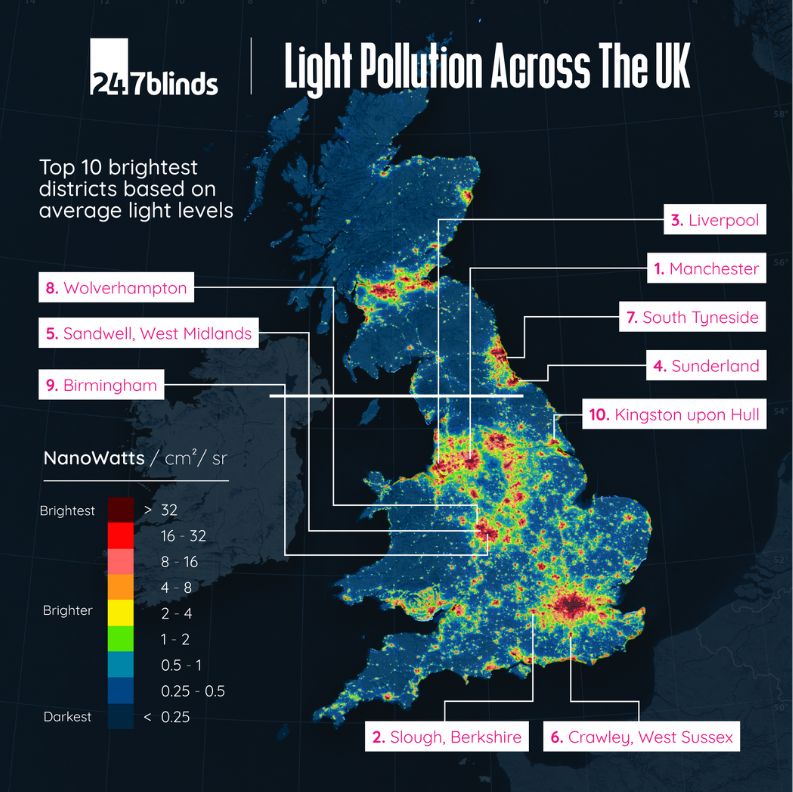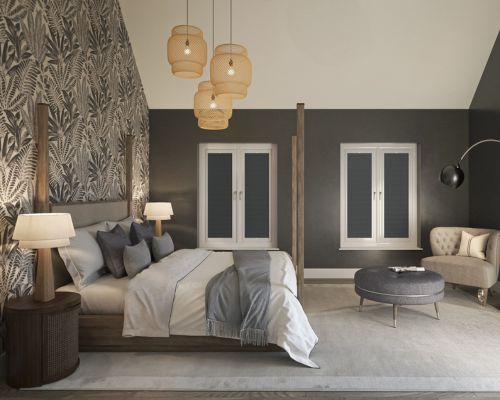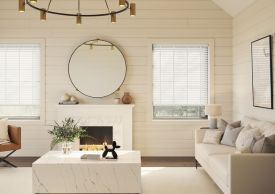Shades of Sleep - Helping the UK Get a Better Night's Rest | 247 Blog
Tips
Posted 27/03/2024
We spend almost a third of our lives sleeping, and the quality of that sleep directly impacts how we feel and how we function. If we aren't getting enough sleep, our metabolisms, cardiovascular systems, immune systems, hormone production and mental health can all suffer as a result.¹ In short, sleep matters!
Only 1 in 5 Brits (22%) believe that they understand all the factors that affect how well they rest.* You've probably seen us and plenty of other window dressing retailers promoting blackout blinds as a tool for better sleep, but how big of an effect does light actually have on our sleep quality? Is something as simple as a blackout roller blind really your ticket to waking up feeling well-rested? And what are the other factors impacting our ability to get a good night's rest...
Over half of Brits claim light damages their ability to sleep well
We analysed the external factors that affect how well people sleep. In our recent survey of 2,000 respondents, just over half of Brits (57%) said that light sources in the bedroom negatively affected their sleep. Temperature also had a big impact and being too hot or cold caused nearly 5 in 10 people (46%) trouble when trying to snooze. Over 41% found noise to be a disturbance, whilst 22% found air quality caused them trouble.
Light was revealed to be the biggest external cause of sleep disturbance among Brits. Studies show that even low levels of light can have detrimental effects on circadian rhythm and increase the risk of waking up.²
We teamed up with Dr Tang to get a medical expert opinion on why light affects our sleep:
Dr Tang explains:
"Sleep can be heavily influenced by environmental factors. Exposure to light, particularly artificial light and electronic screens, can disrupt the body's circadian rhythm, hindering melatonin production."
"It's unsurprising that only 22% of Brits believe they understand all the factors affecting their sleep. Many people may not be aware of the interplay between elements like light exposure, temperature, noise, and personal habits. Additionally, sleep science is continually evolving. Increased awareness and education about sleep hygiene could empower people to make informed choices for better sleep."
"Optimal sleep is achieved in a dark, cool, quiet, and well-ventilated environment, emphasising the importance of managing these factors for a restful night's sleep and overall well-being."
There are important differences between types of light as well. Some types have more illuminance and brightness caused by different wavelengths and this can affect people differently. Men are almost 2x as likely as women to have their sleep affected by natural light.
Dr Tang explains: "One potential explanation for this difference is hormonal variation. Melatonin, a hormone cruical for regulating sleep-wake cycles, can be influenced by sex hormones. Some research suggests that hormonal fluctuations during the menstrual cycle may impact how women respond to light exposure compared to men."
However, both men and women are equally likely to have their sleep affected by artificial light.
So, what is the source of this glaring disturbance? We asked Brits which light sources kept them awake in the bedroom.


Streetlights were the source most likely to cause a disturbance, negatively affecting the sleep of almost half (40%) of Brits. In fact, studies have shown that nights are becoming 10% lighter every year, and it's likely that streetlights are contributing to this significantly.³
City sleepers suffer the most
We analysed how light pollution affects different areas of the UK, and it is bad news for anyone living in Manchester, Slough, and Liverpool!⁴


Whilst efforts are being made to address the ongoing light polution crisis, it's no short-term fix. To help Brits combat the most important externl factor affecting sleep, we've teamed up with our experts to show you how.
Dr Tang's top 3 tips for getting a restful night of sleep.
- A consistent schedule: "It's important to maintain a consistent sleep schedule to regulate your body's internal clock. Make sure to engage in calming activities before bed, such as reading or taking a warm bath to signal to your body it's time to wind down."
- Your sleep environment: "Keep your bedroom dark, quiet and cool, and invest in a comfortable mattress and pillows. Avoid heavy meals, caffeine and nicotine close to bedtime. Relaxation techniques like deep breathing, meditation or yoga can help alleviate stress and promote better sleep."
- Reduce blue light exposure: "To improve melatonin production, reduce exposure to blue light screens at least an hour before bedtime."
Our product specialist Helen O'Connor shares her ultimate styling solution for blocking out streetlights.
Helen said: "If you want a healthier, more rested sleep, getting your window dressings right is so important. Using purpose-made products ensures you can block out almost 100% of outside light sources."
"Whilst blackout blinds and curtains can be used as stand-alone products, I'd always recommend layering both for maximum light reduction (and a super-luxe looking window!). The most important thing when choosing blinds is to ensure that you prioritise made to measure options, ensuring a perfect fit and reducing the risk of light showing through any gaps."
"No drill blackout blinds are the perfect solution for layering with blackout curtains. Their no-tools needed installation makes them the ideal hassle-free solution! Twist&Fit blackout rollers in particular are the quickest and easiest way to block out light in your room."
"Perfect Fit no drill blackout blinds are ideal for any uPVC windows or patio doors you might have in your bedroom, plus you can choose foil-lined honeycomb styles for thermal insulaiton, helping to keep the bedroom at the optimal temperature. For bedrooms with windows that aren't uPVC, Stick Fit blackout blinds are just what you need. As the name suggests, these energy-saving, light-blocking blinds simply stick onto the glass of your windows, offering a permanent no drill solution."
For more blinds and curtains inspiration, visit our blog.
About Dr Chun Tang
Dr Chun Tang is a GMC-registered GP offering a private general practice and a range of family healthcare services at Pall Mall Medical. Dr Tang has a superior understanding of acute and chronic disease management, with 15 years of experience in primary care settings.
Sources
*247 Blinds and Curtains surveyed 2,000 people in the month of February 2024.
- https://www.sleepfoundation.org/how-sleep-works/myths-and-facts-about-sleep
- https://www.sleepfoundation.org/how-sleep-works/myths-and-facts-about-sleep
- https://www.nhm.ac.uk/discover/news/2023/january/increasing-light-pollution-drowning-out-stars.html
- Light pollution data source: https://www.cpre.org.uk/light-pollution-dark-skies-map/ , https://www.cpre.org.uk/wp-content/uploads/2019/11/Night_Blight.pdf




 My Account
My Account
 Wishlist
Wishlist
 Call now
Call now
 Track My Order
Track My Order

















